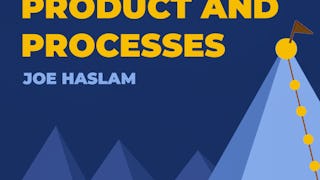- Browse
- Financial Markets
Results for "financial markets"
 Status: Free TrialFree TrialF
Status: Free TrialFree TrialFFundação Instituto de Administração
Skills you'll gain: Big Data, FinTech, Market Data, Analytics, Financial Market, Business Intelligence, Financial Services, Data Analysis, Digital Transformation, Data Science, Data-Driven Decision-Making, Mobile Banking, Banking
4.3·Rating, 4.3 out of 5 stars24 reviewsBeginner · Course · 1 - 4 Weeks
 Status: NewNewStatus: PreviewPreviewU
Status: NewNewStatus: PreviewPreviewUUniversity of Maryland, College Park
Skills you'll gain: Accounting and Finance Software, Unstructured Data, Financial Data, Financial Statement Analysis, Image Analysis, Finance, Financial Analysis, Accounting, Emerging Technologies, Artificial Intelligence, Text Mining, Financial Reporting, Artificial Intelligence and Machine Learning (AI/ML), Machine Learning, Trend Analysis, Data-Driven Decision-Making, Natural Language Processing
Beginner · Course · 1 - 4 Weeks
 A
AAlfaisal University | KLD
Skills you'll gain: Depreciation, Fixed Asset, Asset Management, Property Accounting, Expense Management, Accounting, Business Valuation, Generally Accepted Accounting Principles (GAAP), Financial Reporting, International Financial Reporting Standards
4.8·Rating, 4.8 out of 5 stars16 reviewsBeginner · Course · 1 - 4 Weeks
 Status: Free TrialFree TrialI
Status: Free TrialFree TrialIIE Business School
Skills you'll gain: Growth Strategies, Entrepreneurship, Key Performance Indicators (KPIs), Go To Market Strategy, Sales Management, Product Management, Sales Strategy, New Business Development, Product Development, Operational Efficiency, Product Strategy, Business Strategies, Business Process, Business Strategy, Price Negotiation, Customer Acquisition Management, Customer Insights, Leadership and Management, Fundraising
4.6·Rating, 4.6 out of 5 stars14 reviewsBeginner · Course · 1 - 4 Weeks
 Status: PreviewPreviewU
Status: PreviewPreviewUUniversità di Napoli Federico II
Skills you'll gain: Economic Development, Sustainable Development, Socioeconomics, Financial Inclusion, Economics, Human Capital, Policy Analysis, Econometrics, Program Evaluation, Social Sciences, Analysis, Financial Analysis, Entrepreneurship, Insurance, Regression Analysis
Beginner · Course · 1 - 3 Months
 Status: Free TrialFree TrialF
Status: Free TrialFree TrialFFundação Instituto de Administração
Skills you'll gain: Capital Markets, Financial Systems, Financial Market, Financial Regulation, Financial Policy, Financial Trading, Market Data, Investments, Banking, Financial Services, Economics
4.9·Rating, 4.9 out of 5 stars15 reviewsBeginner · Course · 1 - 4 Weeks

Skills you'll gain: Strategic Prioritization, Competitive Analysis, Business Priorities, Strategic Planning, Strategic Thinking, Case Studies, Business Strategy, Spreadsheet Software, Strategic Decision-Making, Market Analysis, Internal Auditing, External Auditing, Market Opportunities, Entrepreneurship, Leadership and Management
4.3·Rating, 4.3 out of 5 stars11 reviewsIntermediate · Guided Project · Less Than 2 Hours
 Status: PreviewPreviewP
Status: PreviewPreviewPPolitecnico di Milano
Skills you'll gain: Health Policy, Economics, Policy, and Social Studies, Crisis Management, Policty Analysis, Research, and Development, Socioeconomics, Geographic Information Systems, Public Health, Data Science, Financial Modeling, Fundraising and Crowdsourcing, Finance, Network Analysis, Data Collection
4.5·Rating, 4.5 out of 5 stars6 reviewsBeginner · Course · 1 - 3 Months
 Status: Free TrialFree TrialF
Status: Free TrialFree TrialFFundação Instituto de Administração
Skills you'll gain: Deep Learning, Predictive Analytics, FinTech, Data-Driven Decision-Making, Machine Learning, Digital Transformation, Analytics, Artificial Intelligence, Artificial Neural Networks, Finance, Data Science, Automation
4.7·Rating, 4.7 out of 5 stars24 reviewsBeginner · Course · 1 - 4 Weeks
 Status: Free TrialFree TrialU
Status: Free TrialFree TrialUUniversidad Tecnológica Centroamericana
Skills you'll gain: Teaching, Blended Learning, Program Evaluation, Business Planning, Business Strategy, Education Software and Technology, Interactive Learning, Instructional Strategies, Pedagogy, Entrepreneurship, Education and Training, Design Thinking, Project Design, Differentiated Instruction, Proposal Development, Educational Materials, Course Development, Student Engagement, Case Studies, Instructional Design
4.5·Rating, 4.5 out of 5 stars26 reviewsIntermediate · Specialization · 3 - 6 Months
 Status: Free TrialFree TrialP
Status: Free TrialFree TrialPPontificia Universidad Católica de Chile
Skills you'll gain: Capital Markets, Equities, Bankruptcies, Corporate Finance, Corporate Tax, Tax, Financial Policy, Financial Analysis, Business Valuation, Risk Analysis
4.9·Rating, 4.9 out of 5 stars14 reviewsIntermediate · Course · 1 - 3 Months
 Status: PreviewPreviewP
Status: PreviewPreviewPPontificia Universidad Católica del Perú
Skills you'll gain: Behavioral Economics, Human Centered Design, Consumer Behaviour, Economics, Social Sciences, Design and Product, Research Design, Decision Making, Case Studies, Business Ethics
5·Rating, 5 out of 5 stars20 reviewsBeginner · Course · 1 - 4 Weeks
Searches related to financial markets
In summary, here are 10 of our most popular financial markets courses
- Finanças Orientada a Dados: Fundação Instituto de Administração
- AI Applications in Accounting and Finance: University of Maryland, College Park
- محاسبة الممتلكات والمنشآت والمعدات: Alfaisal University | KLD
- Scaling Product and Processes: IE Business School
- Development Economics: Università di Napoli Federico II
- Estrutura e Funcionamento do Mercado: Fundação Instituto de Administração
- Using Advanced SWOT Analysis to Determine Competitiveness: Coursera
- Data science perspectives on pandemic management: Politecnico di Milano
- Fundamentos de Inteligência Artificial para Finanças: Fundação Instituto de Administração
- Metodologías activas para el aprendizaje: Universidad Tecnológica Centroamericana










